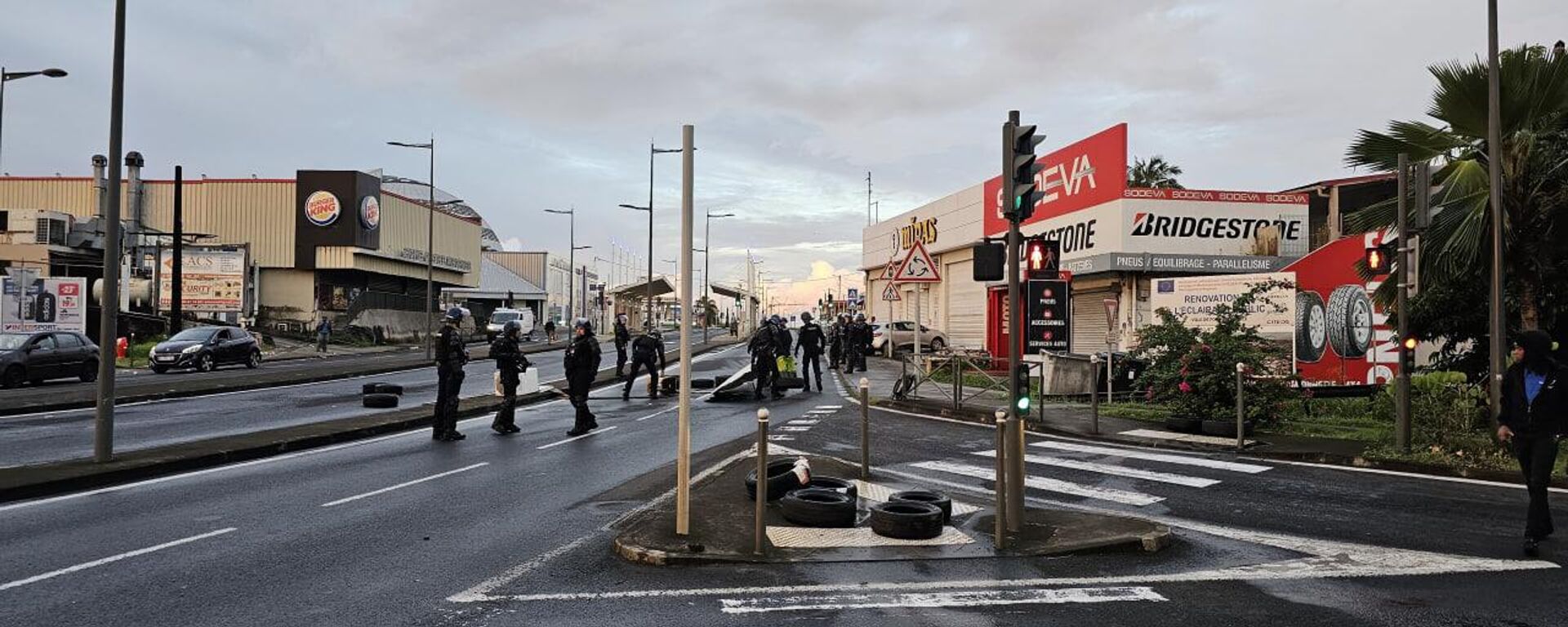https://sputnikglobe.com/20241020/france-struggles-to-contain-martinique-protests-as-price-cutting-deal-falls-short-1120604578.html
France Struggles to Contain Martinique Protests as Price-Cutting Deal Falls Short
France Struggles to Contain Martinique Protests as Price-Cutting Deal Falls Short
Sputnik International
Thousands of residents of the French overseas territory of Martinique in the Caribbean have taken to the streets in the administrative center of Fort-de-France to protest the high cost of living, media has reported.
2024-10-20T03:46+0000
2024-10-20T03:46+0000
2024-10-20T03:46+0000
world
europe
france
caribbean
guadeloupe
https://cdn1.img.sputnikglobe.com/img/07e7/07/02/1111610136_0:160:3072:1888_1920x0_80_0_0_42ad1fd4b09c553f282a8a9fbd5ce6a2.jpg
The protests are ongoing despite a recent agreement between French authorities and local vendors to lower food prices on the island.The agreement was not signed by the Movement for the Protection of the Population and Resources of the Afro-Caribbean Territory (RPPRAC), which called for Saturday's demonstration. According to movement leader Rodrigue Petitot, the agreement only covers a portion of the goods sold on the island.Earlier, the prefecture of Martinique extended its curfew until October 21 due to unrest linked to the cost of living. Protests flared up again on October 7, with demonstrators setting fire to the prefecture building and four nearby police vehicles. Local authorities imposed a curfew on October 10 after 26 police officers were injured during clashes with protesters.Several meetings have been held with government agencies, local authorities, business representatives, and the "Movement for the Protection of Afro-Caribbean Peoples and Resources," which initiated the protests, in an effort to agree on measures to reduce prices.According to France’s National Institute of Statistics and Economic Studies (Insee), food prices on the island are 40% higher than in mainland France. This is largely due to the so-called "sea tax" — customs duties on imported goods to French overseas territories like Guadeloupe, Martinique, French Guiana, Mayotte, and Réunion. This tax, one of the oldest in the French system, was introduced in 1670 in Martinique as a temporary measure. The tax applies to a wide range of goods imported from France, with markups of 15% on biscuits and 50% on cigarettes, for example.
https://sputnikglobe.com/20241015/martinique-govt-extends-curfew-until-october-21-as-public-unrest-continues-1120558661.html
france
caribbean
guadeloupe
Sputnik International
feedback@sputniknews.com
+74956456601
MIA „Rossiya Segodnya“
2024
Sputnik International
feedback@sputniknews.com
+74956456601
MIA „Rossiya Segodnya“
News
en_EN
Sputnik International
feedback@sputniknews.com
+74956456601
MIA „Rossiya Segodnya“
Sputnik International
feedback@sputniknews.com
+74956456601
MIA „Rossiya Segodnya“
france, france's overseas territories, martinique, protests in martinique
france, france's overseas territories, martinique, protests in martinique
France Struggles to Contain Martinique Protests as Price-Cutting Deal Falls Short
Thousands of residents of the French overseas territory of Martinique in the Caribbean have taken to the streets in the administrative center of Fort-de-France to protest the high cost of living, media has reported.
The
protests are ongoing despite a recent agreement between French authorities and local vendors to lower food prices on the island.
The agreement was not signed by the Movement for the Protection of the Population and Resources of the Afro-Caribbean Territory (RPPRAC), which called for Saturday's demonstration. According to movement leader Rodrigue Petitot, the agreement only covers a portion of the goods sold on the island.

15 October 2024, 10:00 GMT
Earlier, the prefecture of Martinique extended
its curfew until October 21 due to unrest linked to the cost of living. Protests flared up again on October 7, with demonstrators setting fire to the prefecture building and four nearby police vehicles. Local authorities imposed a curfew on October 10 after 26 police officers were injured during clashes with protesters.
Since early September, protests over the rising cost of living, particularly food prices, have continued on the island. Demonstrators have attacked police using live ammunition. Amid the riots, French authorities, for the first time in 65 years, deployed a special unit, the CRS, to suppress the protests on the island.
Several meetings have been held with government agencies, local authorities, business representatives, and the "Movement for the Protection of Afro-Caribbean Peoples and Resources," which initiated the protests, in an effort to agree on measures to reduce prices.
According to France’s National Institute of Statistics and Economic Studies (Insee), food prices on the island are 40% higher than in mainland France. This is largely due to the so-called "sea tax" — customs duties on imported goods to French overseas territories like Guadeloupe, Martinique, French Guiana, Mayotte, and Réunion. This tax, one of the oldest in the French system, was introduced in 1670 in Martinique as a temporary measure. The tax applies to a wide range of goods imported from France, with markups of 15% on biscuits and 50% on cigarettes, for example.



